2016-2017 Faculty Fellow Profiles
Written by the Kaplan Institute's Undergraduate Franke Fellows and Affiliates, these profiles encapsulate conversations between paired undergraduates and teaching faculty to highlight the fellows' humanities research projects and extend the interdisciplinary dialogue between students and teachers at Northwestern.
John Alba Cutler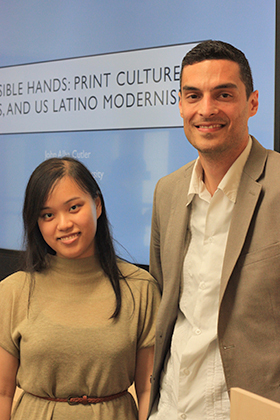
English and Latina/o Studies
Profiled by Naomi Johnson, Undergraduate Franke Fellow (May 2017)
Professor John Alba Cutler thought he wanted to become a high school English teacher until he discovered his love for Chicana/o literature courses in college, which motivated him to pursue his PhD at UCLA. He is now an associate professor of English and Latina/o Studies at Northwestern University, where he teaches courses on Latina/o literatures and poetry. In previous research projects, Professor Cutler has used analyses of Chicana/o literatures to examine the assimilation process in America and to better understand how race and gender intersect with these literatures. His most recent talk at the Kaplan Institute, titled “Invisible Hands: Print Culture, Class, and Latino Modernism," presented the core research questions, motivations, and methodologies for his project on early twentieth-century Spanish-language periodicals in the United States.
Unlike previous inquiries in literary scholarship, which Professor Cutler describes as “evaluative questions” meant to establish what makes literature normatively “good,” the primary research question that motivated his research into archives on Latina/o periodicals in America was meant to pivot attention toward Latinos in America, a population that Professor Cutler says that Anglo-Modernist and Latino Studies have neglected. For Professor Cutler, his research into Latina/o serials in America – which collectively published tens of thousands of literary texts – is meant to start a conversation on the contributions of these serials to modernism. He particularly focused on serials that “compel urgency.” When asked about how he curated these serials from archives, Professor Cutler’s smile touched his eyes as he described how the sheer volume of available data posed a major challenge, but a combination of skilled librarians, research assistants, and funding from Northwestern University allowed him to narrow down the serials that compel sociohistorical urgencies (texts that are innovative or daring).
Through his research into Latina/o serials in America, Professor Cutler found that the narrative that arose by centering racialized and marginalized subjects was that Latinos were building “oppositional cosmopolitanisms” in which they could lay claim to Literature “with a capital L.” As he catalogued the contents of each serial, Professor Cutler also noticed how the many different “registers of language” in which the spatial proximity of the vernacular, high literature, news reports, and persona editorials produce frictions all within one serial. He also noted that these frictions, combined with the tensions between the urge to demonstrate that Latinos, too, “had access to the values and the forms of literatures that “count” on the world stage,” and their unwillingness to erase the peculiarities of their lived realities in America as migrant workers in Texas added to this idea of a contested cosmopolitanism.
Brannon Ingram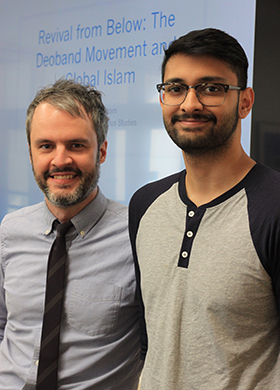
Religious Studies
Profiled by Zain Mohammad Shaikh, Kaplan Undergraduate Affiliate (February 2017)
Professor Brannon Ingram has an extensive background in the study of Islam, and he pulls from that experience in his current project Revival From Below: The Deoband Movement and Global Islam. Dr. Ingram is currently an Assistant Professor in the Department of Religious Studies at Northwestern. He is a specialist in the study of Islam in modern South Africa and South Asia, as well as tradition Muslim scholars (known as ulama) and Sufism. Dr. Ingram has published several works in journals such as South Asia: Journal of South Asian Studies and Critical Research on Religion.
In his current research Dr. Ingram examines the Deoband movement and how it has influenced Islam and Islamic scholarship in the regions where it is prominent. The Deoband movement has gotten attention in recent years in news media due to the connections between the movement and the Taliban. This is one reason why Dr. Ingram felt it was important to conduct research of this kind, clarifying some prominent misconceptions and to analyze the Deoband scholars from an academic perspective. The ulama have always played an essential role in the spiritual lives of Muslims, but the ways they have maintained their relevance over time have evolved.
Dr. Ingram hopes that his work can add to the dialogue that is currently taking place in Islamic Studies and he believes that through the study of Islam and its culture, a better understanding can be reached. One of the key features of the Deoband movement was that it involved highly religious individuals, who were themselves Sufi, internally criticizing some of the practices they saw as somewhat questionable. This reformist movement has its roots in South Asia but quickly spread to South Africa and other regions of the globe as the movement’s followers opened up their own schools in other regions.
Professor Ingram’s involvement with the Alice Kaplan Institute has enabled him to complete his research which will culminate in the form of a book. He also enjoys the interaction with the individuals from the wide variety of backgrounds in the Kaplan cohort. When he’s not working on his own research or interacting with the Kaplan cohort, Professor Ingram often teaches classes on Introduction to Islam, Islamic Law, Sufism, The Qur’an, and Reform and Revival in Modern Islam.
Michelle M. Wright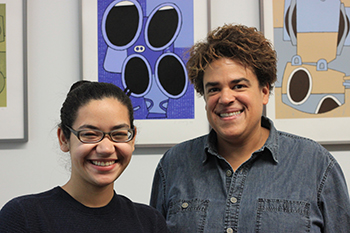
African American Studies and Comparative Literary Studies
Profiled by Anna White, Kaplan Humanities Scholar (February 2017)
Throughout her academic career, Dr. Michelle Wright has been an advocate for marginalized groups both in the United States and across the African diaspora. Dr. Wright is Professor of African American Studies and Comparative Literary Studies at Northwestern, and her research focuses on the African diaspora and the African American identity and experience. Dr. Wright is the author of Becoming Black: Creating Identity in the African Diaspora (Duke UP, 2004) and Physics of Blackness: Beyond the Middle Passage Epistemology (UMN Press, 2015) as well as coeditor, with Antje Schuhmann, of Blackness and Sexualities (Lit Verlag Berlin, 2007) all of which reflect her engagement with marginalized perspectives and identities.
Her current project "Feeling Europe: The African Diaspora and Affect in the Heart of Empire," began as an exploration of how travel narratives constitute a genre unto themselves in Black Studies, but has since grown into a larger rumination of the politics of space in the African Diaspora. "Feeling Europe" now uses the travel narrative genre to analyze Blackness across national, ethnic, gendered and sexualized locales and sites, providing insight into identity as it becomes re-contextualized by place and time in changing landscapes.
Dr. Wright argues that the travel narratives, often passed over and disregarded in favor of works of fiction like poetry, short stories and novels, have something to offer to the studies of the black experience across the globe even in contrast with widely accepted perceptions. Dr. Wright targets the comparison between the separate interracial landscapes that surround individuals through the linguistic expression of emotional experience.
“I want to give voice to people for whom it is hard to speak,” said Dr. Michelle Wright, wary of the potential to overstep the line between advocacy and misrepresentation. The fruits of her labor are obvious in her continued research during her last year as a part of the Northwestern faculty before she moves to Atlanta this fall where she will be the Augustus Baldwin Longstreet Professor of English at Emory University.
Jonathon Glassman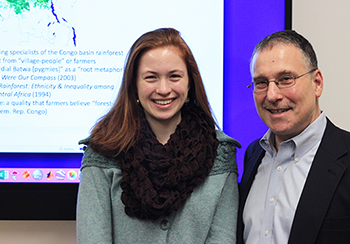
History
Profiled by Pascale Carrel, Kaplan Undergraduate Affiliate (January 2017)
When Dr. Jonathan Glassman was doing research in the East African nation of Zanzibar in the mid-1990s, he was confronted with a fundamental problem. He was studying the 1960s political conflict between people who called themselves Arabs and those who called themselves Africans, and he wondered: can you talk about race in this situation?
Dr. Glassman found himself living amongst and researching a society with ways of thinking about human difference that are quite different from those to which he was accustomed—the people of Zanzibar, he says, think in much more flexible, fluid terms—yet, that very society was faced with a recent, significant conflict along apparently racial lines. Further, he noted that this was not unlike the conflict that ravaged Rwanda in late twentieth century. Dr. Glassman highlights that in both situations, whether given the label of “race” or not, both peoples had clear ways of thinking about human difference. While likely influenced by the Western colonization that took over Africa in the late nineteenth through mid-twentieth centuries, these ways of thinking, or at least elements of them, grew out of pre-existing ideas. It is these ways of thinking, seen across the continent of Africa, that he explores in his current research.
“There are two ways to understand race in comparative terms,” Dr. Glassman said. First is what he calls the “hard or narrow understanding,” which understands race as a quasi-scientific way of dividing humanity into biological categories. But such a definition of race, which was dominant in the West for only a relatively brief period in the late 19th and early 20th centuries, is of limited use when approaching the problem across historical and cultural contexts. Instead, Dr. Glassman uses a “loose or broad” approach, which uses racial science as only one of a “whole series of ways of thinking about racial difference.” Using this tactic, he focuses on the idea of descent as a common differentiator between peoples, looking at historical instances in which “the element of descent became more pronounced” to ultimately create racialized distinctions.
Unlike his previous research, Dr. Glassman’s current project is a library project, in which he reads already existing scholarship and synthesizes it to offer his own interpretation. The finished product, he envisions, will be a book divided into chapters along thematic lines, to ultimately provide “a history of racial thought in African intellectual traditions.”
When asked about the humanities on the whole, Dr. Glassman responded, “the study of humanity is all-encompassing,” and emphasized its inclusivity as the study of all human endeavors. As such, he hopes that by “asking questions about Africans’ ways of thinking about difference, and about civilization, and about barbarism, and about belonging, and about non-belonging…it can help us better understand the way we think of those things ourselves.”
Nitasha Tamar Sharma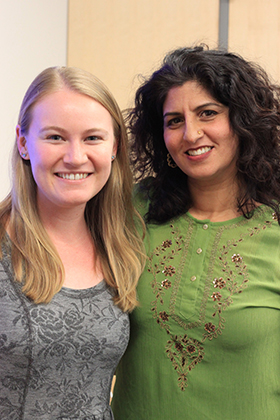
African American Studies, Asian American Studies, and Performance Studies
Profiled by Linnea Hodge, Undergraduate Franke Fellow (November 2016)
Professor Sharma’s current book project, Hidden Hapas, can be described as a homecoming. “I’m born and raised in Hawai’i,” Sharma said, “and when I wrote my application for graduate school, I was going to study mixed race people in Hawai’i, way back in the ‘90s.” Plans change, though, and her dissertation ended up being quite different. It resulted in her first book, Hip Hop Desis: South Asian Americans, Blackness and Global Race Consciousness (2010), which is an ethnography of contemporary South Asian American hip hop artists. “I wanted to know what it was about this Black cultural form of hip hop that spoke to the children of immigrants from India and Sri Lanka, [focusing on] Asian-Black relations.”
Ethnographic research on interrelating minority groups has been an important line through Dr. Sharma’s career thus far: “I really consider myself an ethnographer. I spend time with people, I talk to them, I do fieldwork, I observe people, and I interview them over time in their various [environments]. I’m [also] very invested in analyzing inter-minority relations, so my work de-centers whiteness, even if U.S. notions of racism and Black-White hierarchies are exported globally. I’m really interested in the troubling and generative possibilities of inter-minority exchanges.” As a faculty member in African-American Studies, Asian-American Studies, and Performance Studies, she is very well situated to engage with these crossings-over.
In her second book, Hidden Hapas, Dr. Sharma can finally extend many of these same concerns to the Pacific; “I think that home has always called me,” she said. The book will be an ethnography of mixed race Black people in Hawai’i that analyzes interviewees’ experiences of race, racism, and representation. She has conducted about 60 interviews since 2009, and she is noticing significant patterns. She has found the conversation in the islands to be less fixated on racial categories than on the mainland. In her words, “Something else is happening in Hawai’i. I don’t mean to say that it is a paradise, in contrast to the U.S. continent, but they do say sometimes ‘It’s not paradise but it’s better, it’s less pressure.’” The differing racial conceptions from islands to mainland can be crystalized, Sharma said, in the familiar figure of our Hawai’i-born President Barack Obama: “Obama [is often] depicted and understood in the islands as an ‘island son,’ [but depicted] on the U.S. continent as a Black organizer from Chicago’s South Side.”
She’s also interested in the exchange of racial attitudes between the islands (sometimes thought of locally as an “occupied colony”) and the mainland. She asked, “What is it that the Pacific offers people of African descent? Why do they call it their haven or their respite? On the other hand, I want to talk about how African-Americans from the U.S. mainland bring to Hawai’i a racial paradigm.” The project also takes on the popular representation of the islands: “In Hawai’i, our local ways and tourist images of the islands are not about race, and certainly not about racism and inequality. It’s about multiculturalism and paradise and happy Natives, so that [tension] is what I’d like to talk about.”
A major goal of hers is to use this ethnography of mixed race Black people in Hawai’i to expand our knowledge of mixed race experience in America: “[Hawai’i is] not a Black and White society and twenty percent of people are mixed race, so I think it can really contribute to our understanding, or misunderstanding, of mixed race in the United States.” Beyond this, she aims to put her findings in conversation with apparent conflicts between different ethnic movements. She sees a quasi-competition in academia between the aims of Black liberation and Native self-determination that isn’t reflected in her ethnographic work. She elaborated, “When we interview people who are both Black and Hawaiian, the two groups are not at odds, they’re in the same person. I’m really interested in why our fields of study – Asian-American Studies, Black and Native Studies – seem to have to contest one another, when in fact when you look at people who are Black, Asian, and Native, their lives are less [conflicted] than that.”
The details of her lunchtime talk on November 16 weren’t set in stone as of our conversation in October, but she planned to overview her book project and the concept of the “Black Pacific,” rounding out the lecture with quotes from her interviews. (She may draw from the chapter she recently finished on Black music in Hawai’i.) It promises to be a fascinating presentation, and Dr. Sharma is looking forward to the interdisciplinary conversation one can expect at the Kaplan Institute. She observed, “Disciplines at this point are irrelevant to me. Politics are important, and [whether] you respect the questions that I’m interested in, and if you think the implications are important. So, I like the lack of boundaries at Kaplan; it makes a lot of sense to me.”
Héctor Carrillo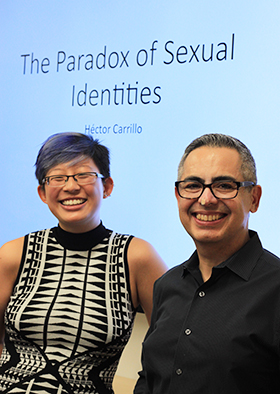
Sociology, Gender and Sexuality Studies
Profiled by Jaclyn Zhou, Undergraduate Franke Fellow (October 2016)
In the 1980s, long before he made the pursuit of knowledge into a career, Héctor Carrillo discovered that ignorance could be fatal.
“I was not interested in the topic of sexuality until the AIDS epidemic happened,” Carrillo said. “I was a young gay man, like many young people in the 1980s, who was hit by this enormous public health problem and we began to see our friends get sick and die.” It was then that he was faced with a problem as practical as it was ideological: “we realized that the knowledge that existed about sexuality in the early 1980s when the epidemic happened was so poor that we didn’t have the tools to do something about it.”
At that time, while working for one of the largest and oldest AIDS organizations in San Francisco, Carrillo and his cohort turned to scholarship on sexuality in order to find solutions. And when existing scholarship was unable to give them the answers they needed, they became scholars themselves, creating research that responded to a very real and pressing need.
“Scholarship offers tools for people who are engaged in the very specific goals of producing change that helps them make arguments, that helps them conceptualize the work that they’re doing and understand the phenomena they’re dealing with in a way that gives new ways of thinking about how to go from A to B,” Carrillo said.
Now in his seventh year as a Northwestern professor, Carrillo holds a dual appointment in sociology and gender and sexuality studies. He identifies himself primarily as a social scientist, but one whose work necessarily draws on interdisciplinary methods and literatures.
“One of the beauties of sexuality studies is that it brings together work that has happened in different fields, particularly in the social sciences and the humanities,” Carrillo said. “It’s a thing that I find very exciting about being able to participate in something like the Kaplan Institute, [which] is open to social scientists like myself to participate in this kind of interdisciplinary dialogue. Instead of being limited to our own literatures in our individual disciplines, we are forced to step out and engage with literatures that come from other epistemological traditions.”
His research generally explores the intersections between sexuality, international migration and health; his early work focused on sexuality in Mexico, and his most recent manuscript looked at sexual migration – people who immigrate due to their sexualities. Through his work on sexual migration, in which he noted the cultural differences that migrants described and the changes in their sexualities that they experienced, he became interested in the ways in which the same desires can be interpreted in different ways.
“I’ve been interested in questions of the social construction of sexuality for a very long time,” Carrillo said. “By that, I mean not the idea that some people have that sexuality is something that you choose, but rather that sexuality is something that gets to be interpreted through social interaction. So whatever sexualities we have, depending on the historical time, the place, the situation, they have very different meanings, and even the same sexualities can mean very different things at different places and moments.
“[My work in Mexico] gave me a sense that American sexualities are not as standard as many people would want to think, and then I became very interested in questions about cultural diversity in the US.”
Through this line of inquiry, Carrillo arrived at his current project, which addresses what he calls “the paradox of sexual identity.” His research works with people whose sexualities cannot be easily placed in dominant identity categories. The project’s first phase worked with men who identify as straight but who have sex with men and women, as well as the partners of those men. In the second, Carrillo plans to interview self-identified gay men who have sex with women.
“I’m trying to use [these men’s] cases as a way to examine the ways in which sexual identity is both enabling and constraining,” Carrillo said. “I'm interested generally in the topic of sexual identity as a construction of modernity that is meant to be enabling, but there are some unanticipated consequences.”
The project will call into question people’s perception of a clearly defined mainstream American sexual culture, and blur the lines between mainstream sexual culture and the “satellite cultures” on the peripheries of the mainstream; this, Carrillo hopes, will lead both to greater theoretical understandings of sexuality, as well as practical knowledge to effect social change. As part of a generation of sexuality scholars whose work began in the AIDS epidemic, the relationship between his academic work and on-the-ground social change has always been clear to him.
“[In the social sciences, we] think always about our work as having both a very important intellectual set of goals, and also applicability in people’s lives,” Carrillo said. “My hope is that the work that I’ve done and that I’m doing contributes to processes of social and cultural change that are meant to produce a more egalitarian society, and I think that’s the goal of many people doing work in gender and sexuality studies.”
